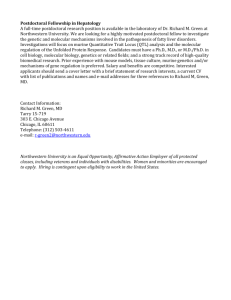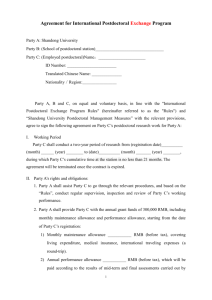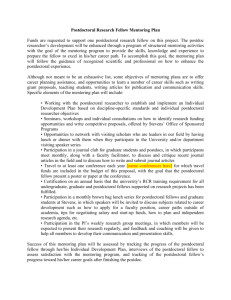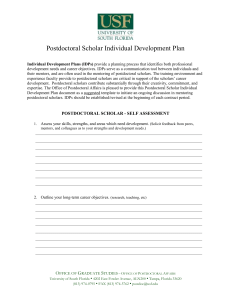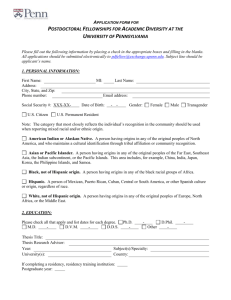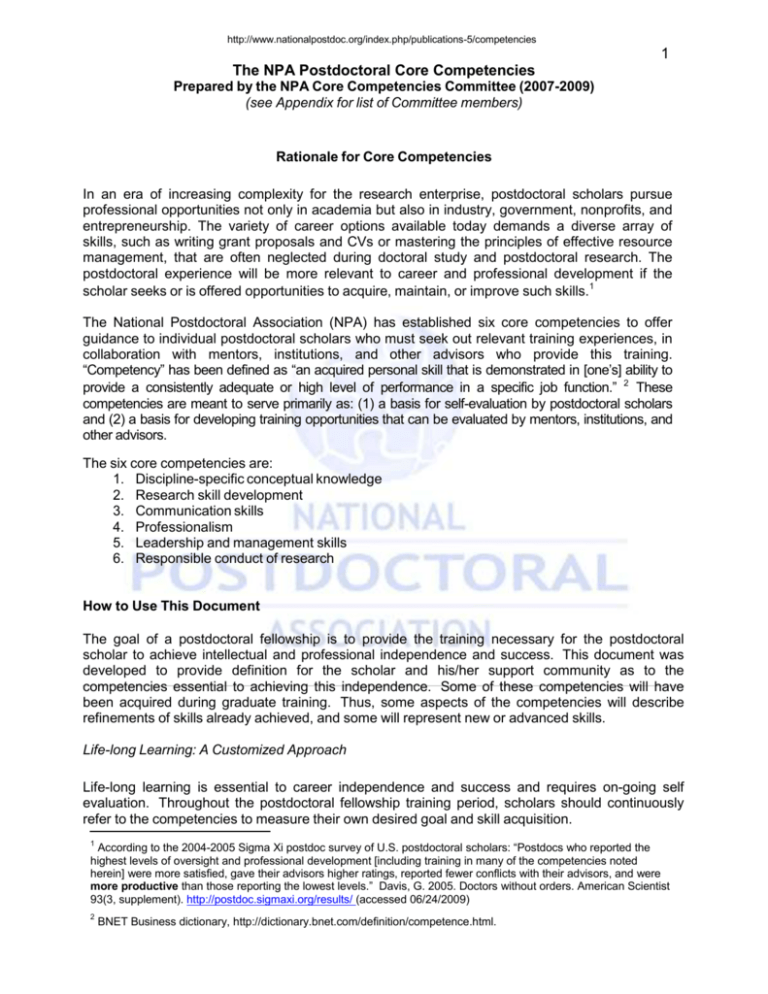
http://www.nationalpostdoc.org/index.php/publications-5/competencies
1
The NPA Postdoctoral Core Competencies
Prepared by the NPA Core Competencies Committee (2007-2009)
(see Appendix for list of Committee members)
Rationale for Core Competencies
In an era of increasing complexity for the research enterprise, postdoctoral scholars pursue
professional opportunities not only in academia but also in industry, government, nonprofits, and
entrepreneurship. The variety of career options available today demands a diverse array of
skills, such as writing grant proposals and CVs or mastering the principles of effective resource
management, that are often neglected during doctoral study and postdoctoral research. The
postdoctoral experience will be more relevant to career and professional development if the
scholar seeks or is offered opportunities to acquire, maintain, or improve such skills.1
The National Postdoctoral Association (NPA) has established six core competencies to offer
guidance to individual postdoctoral scholars who must seek out relevant training experiences, in
collaboration with mentors, institutions, and other advisors who provide this training.
“Competency” has been defined as “an acquired personal skill that is demonstrated in [one’s] ability to
provide a consistently adequate or high level of performance in a specific job function.” 2 These
competencies are meant to serve primarily as: (1) a basis for self-evaluation by postdoctoral scholars
and (2) a basis for developing training opportunities that can be evaluated by mentors, institutions, and
other advisors.
The six core competencies are:
1. Discipline-specific conceptual knowledge
2. Research skill development
3. Communication skills
4. Professionalism
5. Leadership and management skills
6. Responsible conduct of research
How to Use This Document
The goal of a postdoctoral fellowship is to provide the training necessary for the postdoctoral
scholar to achieve intellectual and professional independence and success. This document was
developed to provide definition for the scholar and his/her support community as to the
competencies essential to achieving this independence. Some of these competencies will have
been acquired during graduate training. Thus, some aspects of the competencies will describe
refinements of skills already achieved, and some will represent new or advanced skills.
Life-long Learning: A Customized Approach
Life-long learning is essential to career independence and success and requires on-going self
evaluation. Throughout the postdoctoral fellowship training period, scholars should continuously
refer to the competencies to measure their own desired goal and skill acquisition.
1
According to the 2004-2005 Sigma Xi postdoc survey of U.S. postdoctoral scholars: “Postdocs who reported the
highest levels of oversight and professional development [including training in many of the competencies noted
herein] were more satisfied, gave their advisors higher ratings, reported fewer conflicts with their advisors, and were
more productive than those reporting the lowest levels.” Davis, G. 2005. Doctors without orders. American Scientist
93(3, supplement). http://postdoc.sigmaxi.org/results/ (accessed 06/24/2009)
2
BNET Business dictionary, http://dictionary.bnet.com/definition/competence.html.
http://www.nationalpostdoc.org/index.php/publications-5/competencies
2
Postdoctoral training will be experienced in a variety of ways as a result of the singular aspects of
the postdoctoral appointment, such as the focus on research over coursework or on other skills
relevant to the individual’s intended professional outcome, as well as the integral role of the
supervisor and the diversity of graduate training among postdoctoral scholars. Roughly half of such
scholars have received their Ph.D. degrees outside the United States and, thus, they may begin the
postdoctoral training period with strengths and challenges that vary from those of U.S.-trained
scholars.3 As such, the six core competencies are not intended to be prescriptive or limiting. They
are provided as a resource to be used and adapted in a variety of ways by the many stakeholders
involved in the training experience of postdoctoral scholars.
It is expected that each institution and other users will employ different local, regional and
national resources to provide training in selected competency areas. The career aspirations
and prior experience of each postdoctoral scholar will also result in selection of different
competencies for more in-depth focus by the postdoctoral scholar, mentor(s), and institution.
It should be noted that the Core Competencies are often interrelated. Competency in one area
often affects competency in another area. For example, effective leaders are usually (but not
always) effective communicators, and understanding the principles of Responsible Conduct of
Research will enhance one’s professionalism. Thus, the most effective use of the Core
Competencies may be to identify and focus on development in areas that will lead to growth in
more than one competency.
Examples of Potential Uses of the Competencies
● Postdoctoral scholars can use the competencies as a basis for self-evaluation and to
determine areas for their own self-improvement.
● Investigators can incorporate training in these skills into mentoring activities or group
meetings. They can also use the competencies as a framework for a formal
postdoctoral training plan, a new requirement for all NSF grants supporting postdoctoral
scholars. Some topics could be incorporated into faculty professional development to
encourage their use in informal training situations with postdoctoral scholars.
● Postdoctoral scholars’ office leaders can develop professional development programs
around the competency areas.
● Institutions can play a more substantive role in the training of postdoctoral scholars by
adopting an overarching curriculum of training opportunities.
● Institutions responsible for the development of graduate curricula could use the
competencies as a template for preparing graduate students so that they can continue
their training in these areas as postdoctoral scholars.
● Disciplinary societies can tailor their programming and the services they offer to their
postdoctoral scholar constituents to enhance these competencies.
● Those providing resources to the postdoctoral community could use the competencies
as a guide for their content.
Training Methods: Combining Formal and Informal Methods
A key component to the postdoctoral experience is the mentoring received from postdoctoral
supervisors. Many of the skills outlined in this document can be acquired using informal methods
such as one-on-one mentoring, journal clubs, informal chalk talks, and group meetings. The latter
also provide the opportunity for “mentoring ladders” or multi-generational learning, as
undergraduate and graduate students can learn alongside the postdoctoral scholars. One on one
instruction however may not be feasible in today’s large interdisciplinary research groups and with
demanding schedules. Nor is it prudent to assume that every mentor will have the mastery
required to teach all of these topics. Therefore, formal instruction is an important complement to
informal methods.
3
Sigma Xi Postdoc Survey results http://postdoc.sigmaxi.org/ (accessed 08/12/2008)
http://www.nationalpostdoc.org/index.php/publications-5/competencies
3
Effective formal teaching methods must conform to the individual postdoctoral scholar’s optimal
learning style and the technological limits of the institution. No one didactic method works for all
members of an audience. Many trainees benefit from accessible, individualized online courses
while others would benefit from focused group discussions or didactic lectures. Consequently,
trainers must be prepared to use multiple teaching methods, for example, brownbag lunch
seminars, interactive workshops, podcasts and tele/videoconferences, or guest lecture seminars,
to deliver critical information. Reinforcement of subject matter using different teaching formats
may be organized into a series of frequently-scheduled courses, seminars, or workshops.
Evaluation
One of the most important uses of the Core Competencies is to provide a framework for
constructive evaluation and feedback. The diversity of competencies and skills outlined in this
document can be evaluated using a number of mechanisms including informal feedback on
particular skills, formal job evaluations, an Individual Development Plan (IDP) and other training
program assessments. It is not the intent of this document to outline or list evaluation methods.
Rather, the document should be used to help the fellow proactively create a balanced portfolio of
structured oversight and self-assessment through input from advisors, mentors, peers and
colleagues.
The NPA Core Competencies enforce the notion that the successful transition to
intellectual and professional independence depends on the individual’s responsibility to
embrace self-assessment and to apply it to all the Core Competencies.
SIX CORE COMPETENCIES
I. DISCIPLINE-SPECIFIC KNOWLEDGE
A. Rationale/Conceptual Foundation: In order to expand the knowledge base of a field,
both research concepts and approaches must remain on the cutting edge. An
understanding of the overall relevance of the work to the broader field is also essential.
Graduate students are taught the nature of scientific inquiry and begin to develop an
understanding of the approach to scientific research. The postdoctoral experience should
amplify this knowledge and include an understanding of the importance of innovation and
creativity in scientific investigation, including multidisciplinary approaches to scientific
discovery. Specific knowledge of the culture, language and technical aspects of any
discipline, and the maintenance of these through continuing education efforts, provide a
strong foundation for both traditional and non-traditional professions.
B. Components/Principles: Postdoctoral scholars are expected to demonstrate a
knowledge base of established and evolving information and research within their
discipline and as applicable to their specific area of research. They are also expected to
master hypothesis development, understanding gaps and conflicts, limits, and challenges,
such that they can frame testable hypotheses. A thorough understanding of data
interpretation/analysis and statistical analyses are critical to establishing the significance
of results. Fluency in the language as well as proficiency with the techniques of a specific
discipline or other disciplines with which it may cross provides the framework in which
multidisciplinary studies can be undertaken. A broad knowledge base also provides an
excellent foundation for those individuals who pursue non-bench related professions.
C. Delineation of Specific Skills
1. Analytical approach to defining scientific questions
2. Design of scientifically testable hypotheses
3. Broad based and cross-disciplinary knowledge acquisition
4. Interpretation and analysis of data
http://www.nationalpostdoc.org/index.php/publications-5/competencies
4
D. Resources
Please note: Much of what postdoctoral fellows need to learn under this topic is
discipline specific. The following resources are examples.
1. American Society for Cell Biology (ASCB). CBE—Life Sciences Education.
[online]. Available from: http://www.lifescied.org/. Accessed 2009 June 24
2. ASCB. Cell WEB. [online]. Available from:
http://www.ascb.org/cellweb/index.cfm. Accessed 2009 June 24.
3. McGhee C., Gilhotra A.. Ophthalmology and vision science research: part 2: How
to commence research--Eureka or that's a little unusual? J Cataract Refract
Surg.31(11):2205-11.
4. Hart, C. (2001). Doing a literature search: A comprehensive guide for the
social sciences. London: Sage Publications.
II. RESEARCH SKILL DEVELOPMENT
A. Rationale/Conceptual Foundation: The implicit expectation of a Ph.D. degree is
that the individual is prepared to conduct original research in a specific discipline.
Postdoctoral training should build on the research skills developed in graduate
school to ensure that the individual is adequately equipped to carry out independent
research, whether in bench- or non-bench related professions.
For postdoctoral scholars focused on a research-oriented career, mastering a broad
range of skills is essential preparation for becoming independent investigators within
a complex scientific enterprise. It is vitally important that research-focused
postdoctoral scholars receive formal training in preparation for their new roles as
managers of independent research laboratories or enterprises.
B. Components/Principles: Postdoctoral scholars are expected to have the
fundamental knowledge necessary to identify important gaps in their field, be
capable of designing sound experimental protocols, and competent to perform the
techniques necessary to produce valuable new research findings or to report/teach
these findings.
C. Delineation of Specific Skills
1. Research techniques and laboratory safety
2. Experimental design
3. Data analysis and interpretation
4. Statistical analysis
5. Effective search strategies and critical evaluation of the literature
6. Principles of the peer review process
D. Resources
Please note: Much of what postdoctoral fellows need to learn under this topic is
discipline specific. The following resources provide information that is of general
relevance to scientific research.
1. Barker, K. (1998). At the bench: laboratory navigation. Cold Spring Harbor,
NY: Cold Spring Harbor Laboratory Press.
See:
Chapter 5: Lab Notebooks and Data
Management. Chapter 7-9: Making and
Disposal of Solutions:
2. Making the right moves, 2nd ed. (2006). Research Triangle Park, NC:
Burroughs Wellcome Fund. Chevy Chase, MD: Howard Hughes Medical
Institute. [online]. Available from:
http://www.hhmi.org/resources/labmanagement/moves.html. Accessed 2009
June 24.
http://www.nationalpostdoc.org/index.php/publications-5/competencies
5
3. Boss, J. and Eckert, S. (2006). Academic scientists at work: Navigating the
biomedical research career. New York: Kluwer Academic/Plenum Publishers.
4. McCabe, L. and McCabe, E. (2000). How to succeed in academics. San Diego,
CA: Academic Press.
III. COMMUNICATION SKILLS
A. Rationale/Conceptual Foundation: In any professional environment, the ability to
communicate one’s thoughts in a way that people readily understand is critical.
Although postdoctoral scholars learn many communication skills throughout their
educational lifespan, these skills take time to master. Communication is more than
preparing and sending a message; it is making every effort to be sure that the
message is heard and understood by the appropriate audience
B. Components/Principles: Postdoctoral scholars are expected to demonstrate
interpersonal and other communication skills that enable them to communicate
effectively with colleagues at all levels. They must also be prepared to communicate
with students, media, and society at large. They need to develop writing, speaking,
and listening skills.
C. Delineation of Specific Skills
1. Writing
a. Scientific publications
b. Grants/applications
i. Government
ii. Corporations
iii. Foundations
c. Career
i. CV and resume
ii. Cover letters
iii. Research and teaching statements or portfolios
iv. Letters of recommendation or collaboration
2. Speaking
a. Presenting your research
i. Poster sessions
ii. Conferences/seminars
iii. PowerPoint presentations
b. The job interview
i. Job talks
3. Teaching
a. Teaching methods
b. Learning styles
4. Interpersonal Communication Skills
a. Style, tone and non-verbal cues
b. Negotiation
i. This skill is especially important in difficult economic times, when a
postdoctoral scholar must be able to have a formal conversation with
the PI/mentor/advisor to ask about the lab’s funding in relation to his
or her position.
c. Performance reviews/feedback
d. Difficult conversations/minimizing conflict
5. Special Situations
a. Networking
b. Conflict resolution
c. Managing the news media
http://www.nationalpostdoc.org/index.php/publications-5/competencies
6
d.
D. Resources
Please note: There are numerous articles archived at sciencecareers.org
regarding communication skills. Additionally, the National Communication
Association provides general resources on communication
(http://www.natcom.org/index.asp?sid=34).
Communication in General
1. Cutlip, A., Center. A., and Broom, G. (2006). Effective public relations.
Upper Saddle River, NJ: Pearson Prentice Hall.
2. Robbins, S. and Judge, T. (2007). Organizational behavior. Upper Saddle
River, NJ: Pearson Prentice Hall.
Conflict Resolution
1. Stone, D., Patton, B., and Heen, S. (1999). Difficult conversations. New York:
Penguin Books.
Negotiating
1. Fisher, R., Ury, Wi. and Patton, B. (1991). Getting to yes: Negotiating
agreement without giving in. Boston: Houghton-Mifflin.
Scientific Writing
1. Zeiger, M. (2000). Essentials of writing biomedical research papers.
New York: McGraw-Hill.
2. Gopen, G. and Swan, J. (1990). The science of scientific writing. American
Scientist 78:550-558. [online]. Available from:
http://www.americanscientist.org. Accessed 2009 June 24.
Scientific Presentations
1. Rhodes, J. (1995) and Gargett, A. and Abbott, M. (2005). The
Oceanography Society Council, Cullen, V. and Kappel, E., editors.
Scientifically speaking. [online]. Available from:
http://www.tos.org/resources/publications/sci_speaking.html.
Accessed 2009 June 24.
2. Purrington, C. (2009). Advice on designing scientific posters. [online].
Available from:
http://www.swarthmore.edu/NatSci/cpurrin1/posteradvice.htm. Accessed
2009 June 24.
Teaching
Please note: It is recommended that postdoctoral scholars attend workshops on
teaching that are specific to their disciplines.
1. Silver, H. Strong, R. and Perini, M. (2000). So each may learn:
Integrating learning styles and multiple intelligences. Association for
Supervision and Curriculum Development.
2. Advanced Life Support Group and Walker, M. (1999). Pocket guide to
teaching for medical instructors. London: BMJ Books.
IV. PROFESSIONALISM
A. Rationale/Conceptual Foundation: Professionalism is inseparable from an
individual’s identity as a scholar and is a lifetime trait that matures with time and
experience. The community of scholars defines the accepted etiquette and expected
behaviors of its members to instill and enforce the virtues of honor, integrity,
compassion, cooperation, reliability, and responsibility. Reflecting the values of the
communities in which the scholar works, professionalism enhances the perception of
this work in society.
B. Components/Principles: One’s professionalism is relevant in different contexts that
govern and define the potential interactions the scholar engages with his/her
environment. A proper discussion of professionalism should integrate concepts of:
http://www.nationalpostdoc.org/index.php/publications-5/competencies
7
1. Workplace professionalism, connecting with the immediate working team
2. Institutional professionalism, connecting with the research infrastructure
3. Collegial professionalism, connecting with the discipline of expertise
4. Universal professionalism:, connecting with society in representing an expertise.
C. Delineation of Specific Skills
1. Workplace professionalism: developing social skills and an inclusive environment
as a member of a research team or among different teams through effective and
respectful interactions with diverse students, employees, peers, and supervisors.
a. Assess and uphold workplace etiquette, performance standards, and
project goals with members of a team or in other immediate work
environments (classroom, committee boardroom, editorial boardroom,
virtual lab, etc.)
b. Respect, evaluate, and enhance the intellectual contribution of others
by encouraging nourishing attitudes and relationships
c. Allow others the right to self-expression and opinion to deeply understand
and respect the complex identities of others, their histories, and their
cultures
d. Preserve and promote mentoring relationships within the workplace.
e. Develop confidence in expressing one’s attitudes, observations, or
opinions using positive or reinforcing language.
2. Institutional professionalism: connecting as an employee or representative of an
institution by developing advocacy skills with and seeking assistance from
compliance officers, senior management, or administration (at the institution,
across institutions, or with funding stakeholders).
a. Compliance with rules and regulations
b. Respect, adjust, and comply with unit-specific and institutional norms
and expectations of appearance, conduct, and values
c. Collaborate with senior management and administration through
participation on institutional committees or other internal leadership
opportunities.
3. Collegial professionalism: engaging colleagues, collaborators, and experts as
a citizen to scholarship to maintain the intellectual integrity of the discipline
and the profession.
a. Identify, establish, and maintain effective and trustworthy partnerships
with mentors and collaborators
i. Informal communication (networking and follow-through)
ii. Respecting others’ time and needs in completing goals
iii. Data confidentiality and ownership
iv. Developing rules, expectations, and evaluations for collaborations
v. Peer-review of manuscripts, grant proposals, and competitive awards.
b. Advance and promote the discipline by participating in public and
professional service activities, such as professional societies, editorial
and advisory boards, peer review panels, and institutional committees.
c. Advance and promote the discipline by participating in partnerships with
government agencies, foundations, and/or non-profit organizations, such
as funding agency grant panels or other advocacy/advisory boards to
contribute to the advancement and promotion of the discipline.
d. Identify and manage apparent and actual conflicts of interest,
ethical violations, and violations of expected professional
behavior.
4. Universal professionalism: bearing responsibility for the universal perception of
the profession and his/her contribution towards social justice or improvement as
a representative of the community.
http://www.nationalpostdoc.org/index.php/publications-5/competencies
8
a. Engage and serve the general public (schools, government officials,
other professions, media) to promote the profession
b. Identify societal needs and communicate the impact of the profession to
address those needs to the public’s benefit.
D. Resources
Please note: The NPA Web site provides resources on career development, mentoring,
and other related topics.
Career Resources for Postdocs
1. American Association for the Advancement of Science. (2009). Career basics:
Advice and resources for scientists from Science Careers. [online]. Available
from: http://sciencecareers.org/careerbasics.pdf. Accessed 2009 October 14.
2. American Association for the Advancement of Science. (2009). Career trends:
Careers away from the bench. [online]. Available from:
http://sciencecareers.org/booklets. Accessed 2009 October 14.
3. American Association for the Advancement of Science. Science careers.
[online]. Available from: http://sciencecareers.sciencemag.org/. Accessed
2009 June 24.
4. Vitae: Realising the potential of researchers. [online]. Available
from: http://www.vitae.ac.uk/. Accessed 2009 October 5.
Discussing Professional Identities
1. The National Academies (1989, 1995, 2008). On being a scientist. Washington,
D.C.: National Academy Press.
2. National Institutes of Health. Research and training opportunities. [online].
Available from: http://www.training.nih.gov/careers/workshops.asp. Accessed
2009 October 5. See: How to Succeed in Science
https://webmeeting.nih.gov/p33253210/ .
Diversity Resources for Postdoctoral Scholars
1. American Medical Students Association. (2007). Cultural competency in medical
education: A guidebook for schools. [online]. Available
from:,http://www.amsafoundation.org/pdf/CulturalCompCurriculum.pdf. Accessed
2009 October 5.
Resources for Trainers and Organizers
1. Klein, F. (2008). Giving notice: Why the best and brightest are leaving the workplace
and how you can help them stay. San Francisco: Josey-Bass.
See:, http://www.givingnoticethebook.com/
2. The Level Playing Field Institute (www.lpfi.org)
3. The National Coalition Building Institute International (NCBI) (http://ncbi.org/)
V. LEADERSHIP AND MANAGEMENT SKILLS
A. Rationale/Conceptual Foundation: The development of effective leadership styles
and management skills is crucial for career progression. Understanding which leadership
styles are appropriate for any given time and situation will benefit the person and the
organization and increase performance and productivity. Leaders must also be able to
competently manage projects, budgets, and staff. Outside of the immediate work
environment, leadership skills are essential in order to be active and productive in
professional societies and national organizations, obtain administrative positions, and
collaborate with colleagues both intra- and extramurally. Opportunities to understand
the basic principles of leadership and to develop leadership and management skills need
to be incorporated into the postdoctoral training period. These skills will also help the
person to mentor others more successfully.
B . Components/Principles: Postdoctoral scholars are expected to demonstrate an
understanding of the importance of collaboration within teams and organizations and an
understanding of the skills and techniques needed to facilitate effective team work.
http://www.nationalpostdoc.org/index.php/publications-5/competencies
9
Additionally, they are expected to effectively manage day to day operations as
appropriate within their fields.
1. Management Skills
Postdoctoral scholars are expected to be able to effectively manage staff,
understand principles of project management, develop personal and team priority
setting and time management skills, and collaborate effectively. They must also
develop skills in budget and financial management, demonstrate an understanding of
institutional culture and of institutional compliance and regulatory requirements, and
effectively manage data and resources.
2. Leadership Skills
Postdoctoral scholars should demonstrate self-awareness and an understanding of
individual temperament traits and leadership styles, develop skills needed to work
with individuals with different traits, and pursue leadership opportunities at the local,
institutional, regional and national level through professional committees,
organizations, or societies.
C. Delineation of Specific Skills
1. Management Skills
a. Research Staff Management
i. Writing job description
ii. Recruitment
iii. Hiring/terminating
iv. Mentoring/Retention
v. Performance reviews/feedback
vi. Working with individuals of diverse gender, ethnic, cultural, and
religious backgrounds
vii. Conflict management/difficult conversations
b. Project Management
i. Establishing priorities
ii. Time management
iii. Collaborations (intra/interlab)
iv. Planning
a. Development of overall plan
b. Strategic planning
v. Developing/managing budgets
vi. Tracking material and equipment use
c. Data and Resource Management
i. Recordkeeping in print and electronic media, establishing protocols for
backups of data
ii. Developing/managing budgets
iii. Tracking material and equipment use
d. General Management
i. Running a meeting
ii. Delegating responsibilities
2. Leadership Skills
a. Identifying and clarifying goals
b. Motivating/inspiring others
i. Understanding the long-term strategic vision and helping others to see
where their work/roles fit in this picture
ii. Understanding how to use appropriate leadership styles in any
given situation
c. Serving as a role model
D. Resources
Leadership in General
1. Northouse, P. (2004). Leadership theory and practice, 3rd ed. Thousand Oaks:
Sage Publications.
http://www.nationalpostdoc.org/index.php/publications-5/competencies
10
Leadership in the Laboratory
1. Barker, Kathy (2002). At the helm: A laboratory navigator. New York: Cold Spring
Harbor Laboratory Press.
2. Boss, Jeremy M., Eckert, Susan H. (2003). Academic scientists at work:
Navigating the biomedical research career. New York: Kluwer
Academic/Plenum Publishers.
See:
Chap
ters
2-5.
3. Making the right moves, 2nd ed. (2004). Research Triangle Park, NC: Burroughs
Wellcome Fund. Chevy Chase, MD: Howard Hughes Medical Institute. [online].
Available from: http://www.hhmi.org/labmanagement. Accessed 2009 June 24.
See:
Chap
ters
3-8.
4. Training scientists to make the right moves (2006). Research Triangle Part, NC:
Burroughs Wellcome Fund. Chevy Chase MD: Howard Hughes Medical
Institute. [online]. Available from: http://www.hhmi.org/labmanagement.
Accessed 2009 October 5.
VI. RESPONSIBLE CONDUCT OF RESEARCH (RCR)
A. Rationale/Conceptual Foundation: The pursuit and advancement of knowledge
depend on openness, honesty, objectivity, and trust. Although the focus of many
aspects of the responsible conduct of research is on the biomedical field, the 2005
Office of Science and Technology Policy federal misconduct definition applies to all
disciplines of science.
The ethical dimensions extend beyond simple adherence to rules and guidelines and
parallels of ethical behavior exist in other fields. Accordingly, fellows within or outside the
field of the biomedical sciences should also be trained in those core educational areas
that are appropriate to their field. Moreover, they should be familiar with codes,
guidelines or best practices that their professional societies have generated and be
aware of the federal policies adopted by their granting institutes.
Standards of integrity and professional honor permeate daily professional activities.
Postdoctoral scholars are in the unique position of having little official standing and
significant dependence upon the goodwill of their supervisor, which is especially true for
international scholars whose visa status depends upon continued employment.
Postdoctoral scholars, therefore, may be more vulnerable, and at greater risk, when
encountering issues and challenges associated with the responsible conduct of
research (RCR). Although funding agencies endorse an RCR education requirement
and academic institutions are encouraged to provide RCR instruction to their trainees,
no formal standards on RCR education exist. As future mentors and leaders, however,
postdoctoral scholars will be responsible for upholding and engaging the ethical norms
of their field.
B. Components/Principles: Postdoctoral scholars would be expected to4:
1. Improve their ability to make ethical and legal choices.
Develop appreciation for the range of accepted practices for conducting research.
4
Adapted from the objectives of the Policy on Instruction in the Responsible Conduct
of Research, Office of Research Integrity (ORI), 2000.
http://www.nationalpostdoc.org/index.php/publications-5/competencies
11
2. Be familiar with the regulations, policies, statutes, and guidelines that govern the
conduct of government-funded research, as appropriate.
3. Be aware of the available tools and resources to which they can turn when ethical
questions and concerns arise (see comment under “research misconduct” bullet).
C. Delineation of Specific Skills
1. Data ownership and sharing
a. Sharing of data with collaborators, including industry-specific concerns as
appropriate
b. Ownership and access to data, particularly once a postdoctoral fellow’s
appointment ends
c. Legal ramifications of intellectual property, patents and copyright.
2. Publication practices and responsible authorship
a. Criteria for authorship
b. The elements of responsible publication
3. Research with human subjects (where applicable)
a. Ethical principles for conducting research with human subjects
b. Informed consent and subject confidentiality
c. Institutional Review Boards
d. Reporting clinical trials.
4. Research involving animals (where applicable)
a. Ethical principles and federal policies for conducting research with animals
b. Understanding the Three Rs: Replace, reduce and refine animal use in
research
c. Institutional Animal Care and Use Committee (IACUC).
5. Identifying and mitigating research misconduct
a. Definitions (federal, ORI/PHS, NASA, NEH, NSF, etc.)
b. Reporting procedures
c. The role and risks of being a whistleblower.
6. Conflicts of interest
a. Personal and intellectual conflicts
b. Conflicts of commitment
c. Financial conflicts
d. Profits and intellectual property rights
e. Confidentiality and bias in peer review
f. Conflicts and potential competition between mentor and trainee.
E. Resources
Please note: resources are available on the Office of Research Integrity Web site
(http://ori.hhs.gov/education/rcrrdp) and the National Postdoctoral Web site
(http://www.nationalpostdoc.org/publications/rcr).
1. Anderson M. (2007). Collective openness and other recommendations for the
promotion of research integrity. Science and Engineering Ethics 13(4): 387.
2. European Science Foundation. (2009). ESF-ORI First World Conference on
research integrity: Fostering responsible research.[online]. Available from:
http://www.esf.org/index.php?id=4479. Accessed 2009 October 5.
3. Macrina, F. (2005). Scientific integrity: Text and cases in responsible
conduct of research, 3rd ed. Washington, D.C.: ASM Press
4. Office of Research Integrity, U.S. Department of Health and Human Services.
(2006). Federal research misconduct policy. [online]. Available from:
http://ori.hhs.gov/policies/fed_research_misconduct.shtml. Accessed 2009
October 5.
5. Steneck, N. and Bulger, R. (2007). The history, purpose, and future of instruction in
the responsible conduct of research. Academic Medicine 82(9): 829.
http://www.nationalpostdoc.org/index.php/publications-5/competencies
12
Appendix
The National Postdoctoral Association
Core Competencies Committee*
●
●
●
●
●
●
●
●
●
●
●
Lida Anestidou, Ph.D., Program Officer, The National Academies Program
Joan Chesney, M. D., Member, Department of Infectious Diseases, St. Jude Children's
Research Hospital
Emil Chuck, Ph.D., Faculty Member, Student Academic Affairs and Advising, Health
Professions Advisor & Term Assistant Professor, George Mason University
Phil Clifford, Ph.D., Professor of Anesthesiology and Physiology & Associate Dean for
Postdoctoral Education, Medical College of Wisconsin
Lisa Curtis, Ph.D., Instructor of Medicine, Department of Medicine, Division of
Nephrology, University of Alabama at Birmingham
Jennifer Hobin, Ph.D., Senior Science Policy Analyst, Office of Public Affairs, Federation
of American Societies for Experimental Biology, joined committee in 2009
Cathee Johnson Phillips, M.A., Executive Director, NPA (2008-present), joined
committee in 2009
Keith Micoli, Ph.D., Postdoctoral Program Manager, NYU School of Medicine, Sackler
Institute of Graduate Biomedical Sciences
Lucia Mokres, D.V.M., Program Specialist, Hantel Technologies
Alyson Reed, M.B.A., Former Executive Director, NPA
Nancy Schwartz, Ph.D., Dean for Graduate and Postdoctoral Affairs, University of
Chicago
*Titles and institutions listed here were correct during the members’ terms of service on the
committee and may have changed since then.

